
Oct 25, 2017
Delegates to the 2017 AFL-CIO Convention today unanimously passed a resolution supporting the Solidarity Center’s 20th Anniversary.

Solidarity Center Executive Director Shawna Bader-Blau says the Solidarity Center will “double down” in its next 20 years on advancing an agenda of inclusion for the global labor movement in asserting the right to form unions. Credit: Kaveh Sadari
“The Solidarity Center is at the forefront of global movements to protect freedom of association and hold corporations accountable,” according to the resolution. “As the Solidarity Center begins its next 20 years, it commits its future to a global labor movement based on true equality and inclusion for all workers.”
Speaking to convention delegates, Solidarity Center Executive Director Shawna Bader-Blau outlined rising global income inequality, gender pay imbalance and attacks on worker and union rights, but said that “workers everywhere win when we have a deliberate agenda of inclusion for our labor movement, and when we fight for our right to form unions.
“And the Solidarity Center—with you, and with the dozens of unions and millions of workers we can ALL call allies—will double down on that over the next 20 years to make sure it happens.”

CBTU President Terry Melvin was among convention delegates speakng in support of the AFL-CIO resolution on the Solidarity Center’s 20th anniversary. Credit: Solidarity Center/Tula Connell
Bricklayers President Jim Boland introduced the resolution, and representatives of several U.S. unions and affiliated organizations stood to speak in support of Resolution 26: “The Solidarity Center—Twenty Years of Standing up for Workers around the World,” including Coalition of Black Trade Unions (CBTU) President Terry Melvin and IFPTE President Gregg Junemann.
The Solidarity Center is holding its 20th Anniversary celebration dinner November 15 in Washington, D.C. Sponsorship opportunities are available, and there is still time to buy individual tickets.
In conjunction with the celebration, the Solidarity Center also is hosting a book launch discussion on the new publication, Informal Workers and Collective Action. Click here to RSVP.
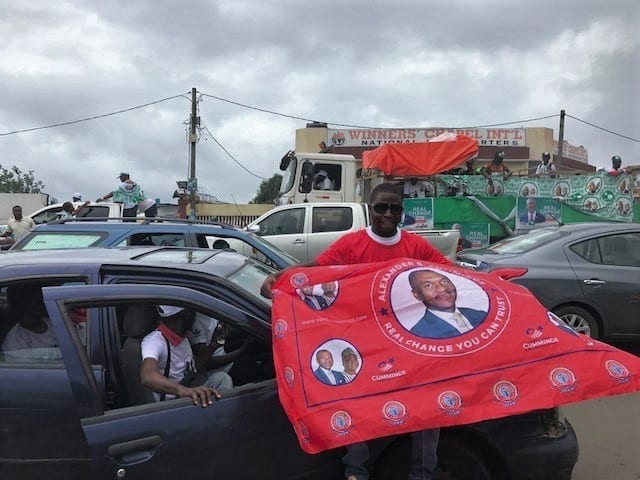
Oct 18, 2017
For the first time, the Liberian labor movement was an organized and active participant in the country’s presidential election, engaging in get-out-the-vote efforts and monitoring polling sites.
Asserting their right to participate in the democratic process, 50 people associated with Liberia’s labor federation, the Liberia Labor Congress (LLC), helped monitor 10 precincts and more than 40 polling places in and around Monrovia, the capital, and on a rubber plantation in Harbel last week, as Liberians went to the polls. Election monitors, including from locals affiliated with the United Steelworkers and the United Steelworkers Canada (USW) reported that the process was fair, if disorganized in places, and that Liberia’s unions ran a successful get-out-the vote campaign targeting workers.
This year the LLC and its affiliated unions engaged in voter registration drives, focusing on places where there is a high concentration of union members, such as mining areas in Nimba County, the port city of Buchanan and Harbel, Marigbi County, location of a major rubber plantation.
Unions must participate in the democratic process said election monitor Jackie Doe, women’s chair-elect of the LLC. We must promote good leadership, she said, “for the well-being of the workers of Liberia.”
On the rubber plantation, worker election teams were well-organized, according to Mike Zielinski, USW Local 3657, facilitating a smoother voting process than seen in other parts of the country. Union families turned out in large numbers, he said, sending a message that elected officials must represent working people.
On election day, union observers encouraged voters frustrated with long lines at some polling stations to stay in line and reminded officials that everyone in line at 6 p.m., when the polls closed, was still entitled to vote, per the country’s election guidelines.
The election saw more than 2.1 million voters choosing among 20 candidates vying to succeed Africa’s first female president and Nobel Peace Prize winner, Ellen Johnson Sirleaf, who has overseen 12 years of peace in a country that was previously ravaged by two civil wars.
Election authorities announced on October 17 that, because no one candidate won more than 50 percent of the vote, a presidential runoff is scheduled for November 7. Former international soccer superstar George Weah and Vice President Joseph Boakai will face off in the second round.
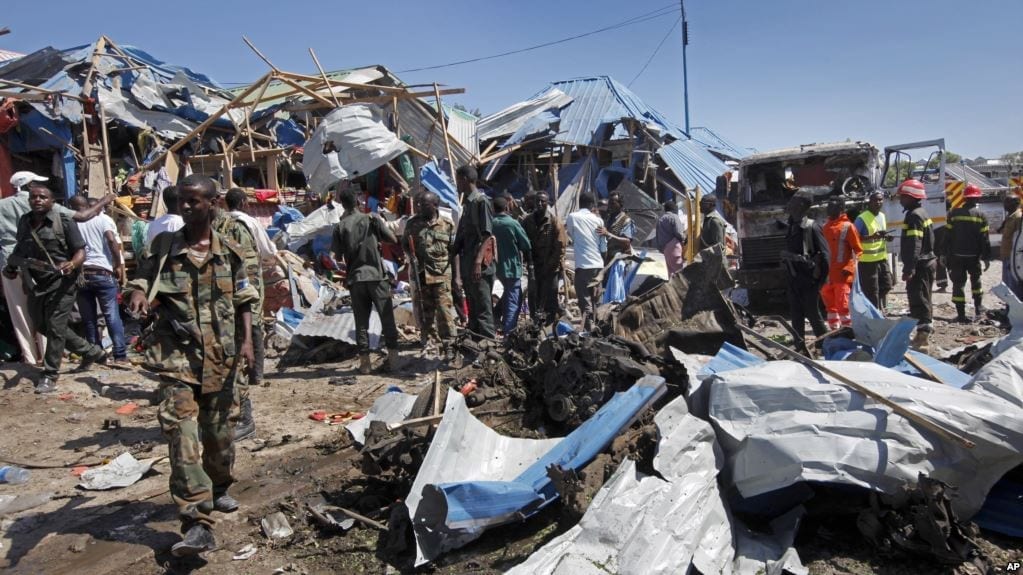
Oct 17, 2017
At least 300 people are now confirmed dead and 500 injured from the weekend’s double car bomb attack in Mogadishu, Somalia, that targeted two areas, including a busy hotel and shopping district.
More than 75 union members are among the dead. Among them, at least 50 transport union members and more than 25 hotel workers.
Condemning the attack, Mohamed Osman Haji, chairman of the Somali Congress of Trade Unions (SOCOTU), pledged SOCOTU’s support to the injured people and called on the workers and the people of Somalia to remain calm and exercise restraint.
“The SOCOTU will give all the moral and material support it can to the families of the workers and people affected in this tragedy,” he says.
The country’s health facilities are overwhelmed with the extent and scope of the injuries. Some of the wounded are being airlifted to Turkey for medical assistance, and unions are working to ensure all the injured have access to medical care, including the ability to pay for such care.
SOCOTU unions represent teachers, communications and health workers, as well as transport and service industry employees.
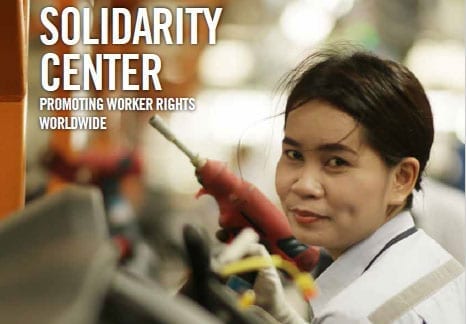
Oct 13, 2017
Over the past year, the Confederation of Trade Unions-Myanmar (CTUM) added 7,000 members and the El Salvador sugarcane cutters union, SITRACANA, affiliated 936 new members between with Solidarity Center support. Meanwhile, through cooperation with the Solidarity Center and Iraqi unions, the government of Iraq began implementing the labor law that went into effect in 2015.
These are some of the many examples in the new Solidarity Center Annual report that detail how the Solidarity Center is empowering workers to raise their voice for dignity on the job, justice in their communities and greater equality in the global economy.
Find out more in our 2016 Annual Report!
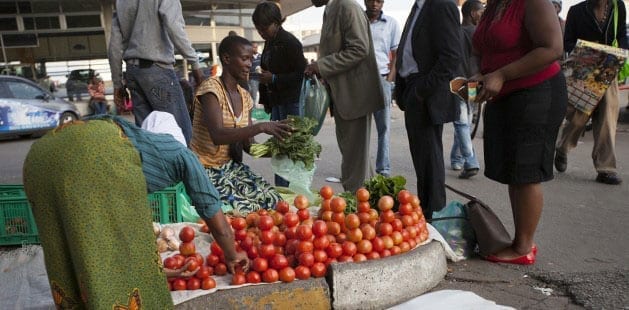
Oct 11, 2017
The government in Zimbabwe is moving to ban market vendors in Harare at a time when more than 90 percent of the workforce labors in the informal economy and 85 percent or more Zimbabweans are seeking decent work.
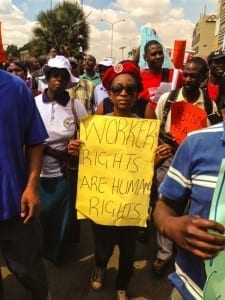
Zimbabweans are struggling for their fundamental right to earn a living. Credit: Thando Khoza
“People who are into street vending are not into it for their liking, but are being forced due to the collapsed economy,” the Zimbabwe Congress of Trade Unions (ZCTU) says in a statement.
“Instead of harassing vendors, the government must first of all restore economic growth and create the promised 2.2 million jobs. By doing so, all vendors will vanish overnight,” says ZCTU.
The Zimbabwe Chamber of Informal Economy Associations (ZCIEA), which represents some 200,000 members, has been seeking to address challenges identified by government and business in negotiations with the Harare central business district since January, and urges that “Operation Restore Order” ordered by the Harare City Council acting town clerk not be implemented.
“The laws and regulations which govern the informal economy are very much outdated and informal economy traders are always criminalized or termed illegal,” ZCIEA says in a statement. ZCIEA says the government’s designated vending sites are not accessible to customers because of their distance, and urges continued discussion among vendors and central business district representatives.
Since 2011, more than 6,000 companies have closed, leaving hundreds of thousands without employment. Even those with formal economy jobs are not paid on time, according to the Solidarity Center report, “Working Without Pay: Wage Theft in Zimbabwe.”

Zimbabwe street vendors also were targeted with eviction in 2016 and protested the move in Harare. Credit: Solidarity Center
Many people have turned to street vending after losing their jobs, and the 2.2 million market vendors now generate an average $3.96 billion in annual revenue. The number of market vendors also has increased because people are struggling to get by following a recent sharp hike in prices for basic goods.
The government waged a similar crackdown on market vendors in 2015, tearing down market stands and forcing vendors to pay high fees to set up stalls at government-approved sites.









